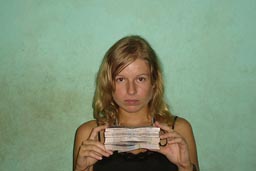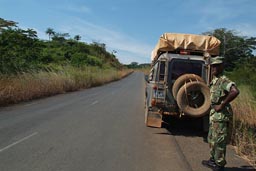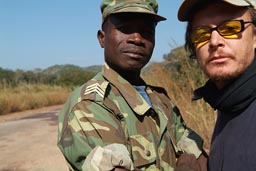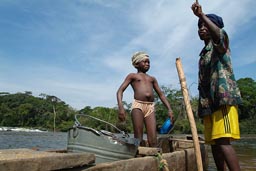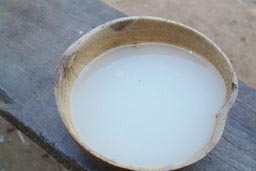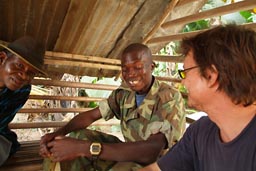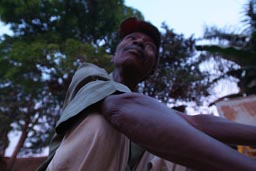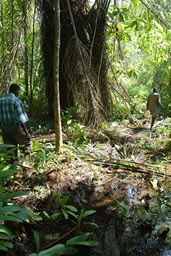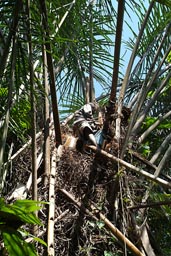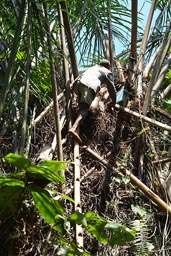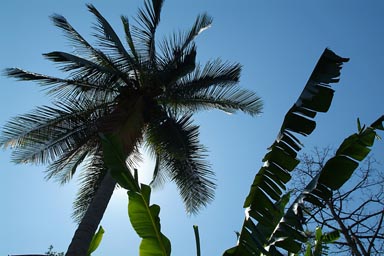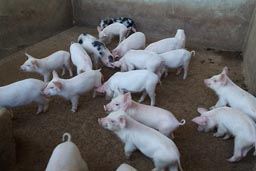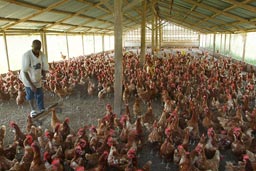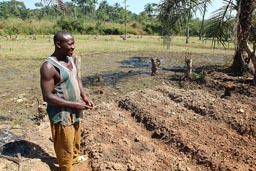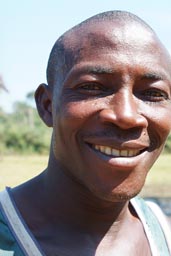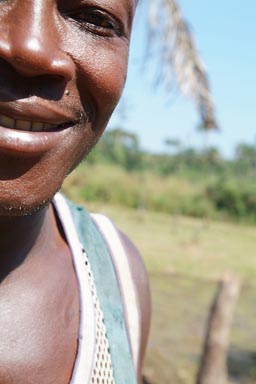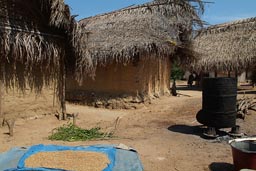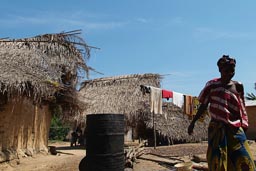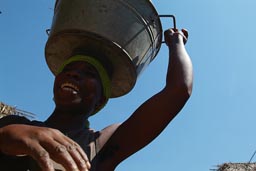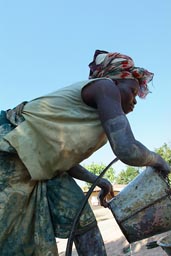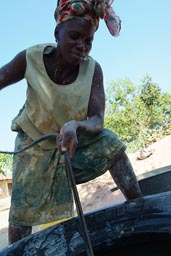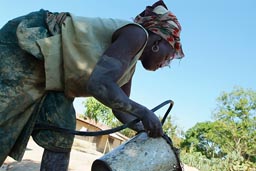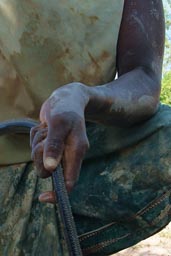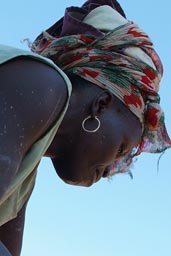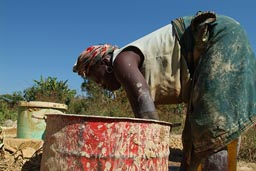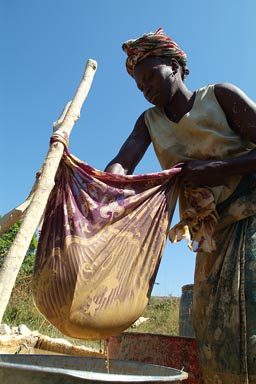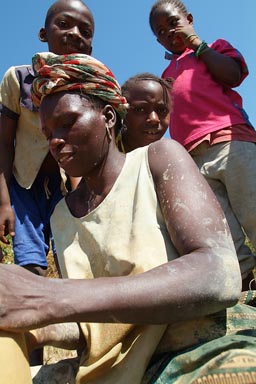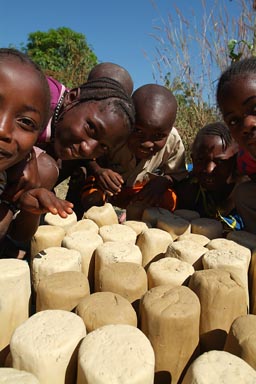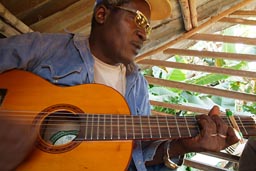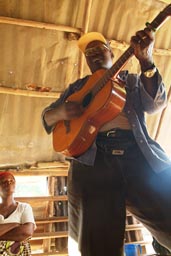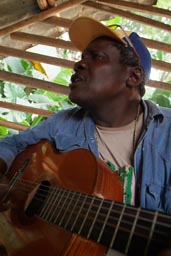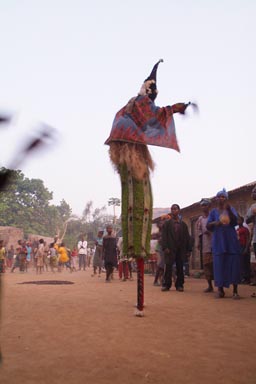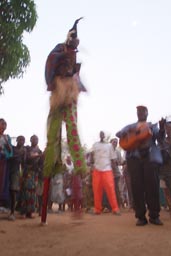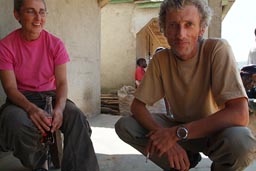www.thisfabtrek.com > journey > africa > guinea > 20061201-macenta
You have to understand, he is the president.
In N'zérékoré I know my way round a bit, internet, bars, anyway Jacques is always by my side. Finally I get myself to changing money, for 100 Euros I receive a packet of notes, 800,000 Guinean Francs FG). Now I understand why some people always carry a big black plastic bag with them.
After the arduous climb the day before we allow ourselves a beer in the fine Hotel Mount Nimba in N'zérékoré, the only respectable place in the South. But it is empty. No business people, no tourists, a few NGO officials. "Lansana Conté, gave it to us." says Jacques a bit proud. "What do you mean he gave it ...?", "He is the 3rd richest man in Africa", even prouder. [Which is probably not true]. "So how did he manage to become so rich?", "You have to understand, he is the president!"
Does not answer my question, understand he is the president, but I decide to leave it there.
We meet Jacques' sister Marie again, and we eat another delicious rice and sauce of feuille Manioc, a rich red palm oil spiced spinach like sauce. Red palm oil is extremely rich in vitamin A, a natural source of carotene.
"There are fewer blind people in the South, just 2%, compared to 20% in the Savanna region", explains me Jacques "because we have the red oil". He would later convince me to take some 20 litres home to his wife in Kindia. "And his wife would be dancing that day". If it has vitamins, and he has 4 small children, why not.
But we have eaten lots of rice and sauce (soup, Jacques calls it) well spiced recently. And I am beginning to think that I can handle nonstop Diarrhoea.
Or not? Anyway I am longing for Conakry and some junk food. But this is still a few days away.
So Jacques and I leave for the North on 30th of Nov. Why not take him north, he has been a good companion and host. "And roads are good to the north", he has convinced me and "we'd pass more of my home territories".
Macenta.
Download GPS (KML) track/waypoints.
Toma are from around Macenta, are one of the ethnic groups and languages of the Forest Region. With Kissi and Guerze they form the 3 minorities opposite to the 3 larger ethnic groups Malinke, Soussou and Peul.
Soropoguis (-gui) are Toma, are from here, the village before Macenta. And Jacques introduces me to another brother of his Siba Bulgare Soropogui, igenieure agronôme.
The whole region up west and north to Guékédou and Kissidougou is as well the area where Jacques has fought some 3 to 6 years ago protecting cities like Macenta when rebels crossed borders from Liberia/Sierra Leone. Some fighting took place just around the very place where Siba Bulgare lives. The Guinean army round here is quite highly regarded by the population.
White wine of raffia, Farming the jungle.
The village just before Macenta, Jacques is well known by almost everyone. And curious is everyone who he has brought with him. Long before sunset we find ourselves in a little shed, a bar that serves nothing but white wine of raffia out of 20l white plastic containers. Long after sunset we are still here.
Raffia is a white fresh fermented liquid obtained daily from the raffia palm by cutting its bark. But the tree only provides the up to 20l per day alcoholic fluid at the end of his 7year life cycle. After one or two months of production the palm dies. "Then we search for a new tree. Before no one really cared about the white wine, but now it is quite liked. That's why we plant these trees now. The one you plant is yours."
Farm nearby.
Morning next day 9 o'clock, the Italian espresso machine is steaming. I try to wake up. My head is tired. While I sit down offering the strong brew to Jaques and Siba, the young boys from around come back from school already, "there are not enough teachers".
Siba and his wife, Jacques and I, I still with a heavy head, leave soon for Siafata, another village 10km south. Following my request the day before Siba shows me the raffia palm wine "productions", we cross some swampy terrain, a rice field is just next. Also he shows me what else grows or is cultivated. It really is all skimble-scamble, bananas and plantain, coffee and cola, feulle manioc and other edible leaves, manioc (cassava), some rice where it is swampy, raffias and other (tall) palm trees (live 150years, give wine too), papaya, yam, bamboo, sugar cane, - and so much more is edible. Before I just saw jungle.
My head is still dizzy ... - A "real" farm is just a stone throw away and Koï Koï Kalivogui, the proud owner or manager (not sure), is happy to show us round. "All semi-free range" he explains, the way they do it in France. I am surprised by the cleanness. He has sold many thousands of chickens this year, "this is the final pack".Oh yes: and Hogs, the South of Guinea has a large Christian population.
Finally we sit down. Walking around has been tough for me and my heavy head. But thanks god we have taken one smaller plastic container down from the top of the raffia tree. So I go with the crowd and soon my heavy head feels better, as I cure a raffia hang over with more raffia white wine.
While I take large mouthfuls of the again deliciously fresh tasting white juice with its light aftertaste, a chicken is being slaughtered and cooked in red palm oil, producing a spicy sauce with bony pieces of chicken served with huge amounts of rice. Head ache slowly fades away, diarrhoea makes a sure comeback. But I am prepared, learnt to live with it.
Picturesque the village of Siafata from where we sit. The black carbonised iron barrel is being used to cook the palm fruits, extract the "first oil", the vitamin rich red palm oil. In a second round the "used" kernels are being sun dried and reboiled for obtaining a lesser quality white palm oil. Wikipedia. All the time while my head gets lighter enjoying anew the juice these femmes walk by us carrying huge troughs of palm kernels. Women in Africa are so strong, work hard, carry heavy loads, but are always ready to smile, whether still children, pregnant or old.
Clay washing
I have sorted the head ache problem during the lunch session in Siafata. Back in Sibas' home I get to know Vidor Pluvogui. One more strong hard working smiling woman. Vidor works for herself, separating sand from clay (soil which contains a high percentage of silicates of aluminium, that is used for pottery and the making of tiles). Her clay cylinders that are sold as far as Bamako and Conakry she sells for 500FG (6c). Not much but enough to make a living.
Zézé and more Raffia wine (what else).
Afternoon advances and Jacques and Siba and I find ourselves in the bar, raffia-shed from the night before. A guitarist/bard really a griot, Zézé Zoumanigui (artist musician à Macenta, Guinée Conakry) is being called in. And Zézé sings from his wide repertoire while strumming on his bolted together acoustic guitar with its strings of wire that he gathered from a friends motorcycle garage.
We become friends quickly and when I sing and play some Oasis for them people from around gather outside the shed. "It's the English I still want to learn" he laments and that I must not leave without teaching him Don't look back in anger and Wonderwall.
Later he sings praise songs in Toma on me, and Jacques and the Army and ...
I made him the happiest man when I promised that I'd leave a pack of 6 new nylon guitar strings with Siba Bulgare. I am carrying a range of strings on the top of the Landy.
A mask/masque at dusk.
Just before dusk there is big exitement outside, screaming and shouting, a big turmoil. Everyone is up to his feet, the whole village. A mask, (a socerer, a feticheur? I don't know) makes his appearance. People run, have enormouse respect of this priest of sorts.
to Conakry.
On 2nd of Dec we leave.
The road takes us via Guékédou and Kissidougou. Over the last 15 years both towns have become well known for harbouring tens of thousands of Liberian and Sierra Leone refugees. The days of Charles Taylor seem finally to have come to an end and repatriation has begun (UNHCR-pdf). Still the impact is being felt, with hundreds lining the streets in both towns asking for a ride.
We just stop for a bite and a beer, here and there, Jacques has companions everywhere, and we stop to have the front left wheel bearing tightened and greased, no big deal. Of course we take any number of passengers, the pregnant young lady of whom Jacques (I) has bought the red palm oil (she was on a walk to the next village with 20!! litres), or the student on his way to Conakry, but most stranded wait for transport that does not exist. Jacques indeed is lucky.
But so am I. His all family's hospitality has affected me strongly, but it is the enormous insight that he enabled me to grasp, about Guinea and Guinean's life ... and not least having him about made me feel a lot more secure, really never ever have I been afraid of anything.
And then we meet the apparently only other tourists in southern Guinea these days. Austrian friends with whom I had dinner in Bamako just 2 weeks ago Anna and Thomas. This is sheer chance occurrence. I thought them in Mali's East.
On to Kindia on 3rd where I deliver Jacques to his young wife Jacqueline and his 4 young children. Jacqueline dances. In the end, Jacques is asking for it, and I make him a little present, he deserves it, and really his current situation makes him worry how nourish his family. 100,000GF (12Euros) or 4 month of rent or another 20 litres of red palm oil.
Back on my own I enter Conakry on 4th of Dec in the afternoon. It is hot and humid here compared to the colder climate of the last 2 weeks, and I am longing for some Charwarmas after all that rice and sauce.
www.thisfabtrek.com > journey > africa > guinea > 20061201-macenta

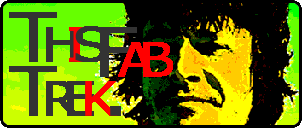

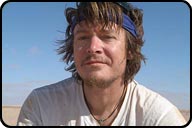
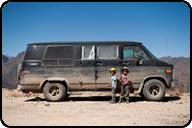
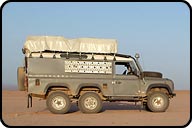

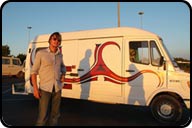
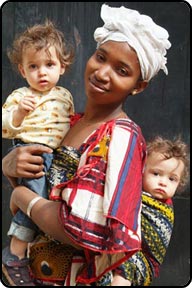
 contains Festival/Fiesta/Art photography.
contains Festival/Fiesta/Art photography.
